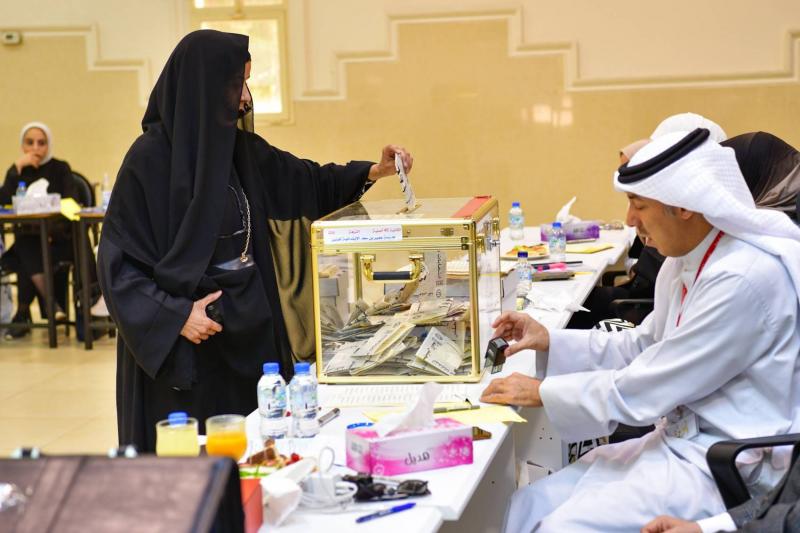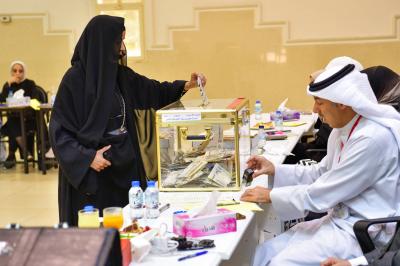Polling centers in Kuwait closed their doors during the parliamentary elections held today, Tuesday, in preparation for the beginning of the vote counting process, followed by the announcement of the fifty winners who will represent the people in the new National Assembly, which has a constitutional term of four years.
After the official voting time ended at 8 PM (5 PM GMT), the polling stations closed their doors, allowing those present to cast their votes. Kuwaiti television immediately began live coverage to monitor the results as they were being counted, before announcing the numbers received by each candidate. The Amir of the country, Sheikh Nawaf Al-Ahmad Al-Jaber Al-Sabah, thanked senior state officials and judges for their efforts during the elections, which were conducted "with efficiency and transparency," praising the national spirit of citizens "and their active participation in exercising their constitutional right to vote." Throughout the day, Kuwaitis flocked to polling centers to cast their votes for the third time in two and a half years.
By mid-morning, voting was proceeding normally at the Mashaan Al-Khader School polling station in the Mushrif area, designated for male voters, with a relatively low turnout and rising temperatures exceeding forty degrees. Judge Mohammed Al-Nasrallah, an official at this school’s committee, stated, "Things are good. We are still at the beginning of the voting process, and things will get better, God willing." Outside the polling places, security and traffic officers were organized to manage the flow of people, while candidates greeted voters. Additionally, civil defense personnel were present to assist the elderly and weak individuals, transporting them in wheelchairs.
Mohammed Nizar, a retired engineer aged 60, remarked that attendance was weak compared to previous elections due to the frequent elections. He added, "People are tired. There is deep frustration. At home, I thought a thousand times before deciding to vote," considering that Kuwait desperately needs "to implement the law on everyone and break favoritism and nepotism." Conversely, Abu Qutaybah, a 22-year-old university student, observed that some people had lost hope while others remained steadfast in their right to vote no matter what happened. He affirmed that housing and education issues should take priority in the upcoming parliament and government, believing that "there is progress, but it is very slow."
In this election, 207 candidates are competing, the lowest number in over five decades, while the number of male and female voters is approximately 794,000. Elections are held at 759 polling stations spread across 118 schools in the six governorates of Kuwait. The elections are supervised by judges and conducted according to the single vote system, which allows each voter the right to cast their vote for only one candidate. The voting takes place in one day from 8 AM to 8 PM. Kuwait consists of five electoral districts, each represented by ten members in parliament, with candidates who place in the top ten in each district winning parliamentary membership. Political parties are prohibited in Kuwait; however, the parliament has significant powers compared to other Gulf countries, including the right to question the Prime Minister and ministers, pass laws, and reject or annul them. Nevertheless, the Amir has the final say in the country's affairs and possesses the authority to dissolve parliament.
The Cabinet stated that it reviewed, during its meeting yesterday, the latest arrangements and preparations to organize the 2023 National Assembly elections "to enable voters to choose their candidates easily in an atmosphere of freedom and democracy."
This election comes after the constitutional court ruling in March that annulled the elections of September and reinstated the 2020 parliament, which the Crown Prince had ordered to dissolve last year following a severe political crisis between opposition MPs and the then government of Sheikh Sabah Khaled Al-Sabah.
After this ruling, political life entered a state of ambiguity, especially since the reinstated 2020 parliament was not on good terms with the new government headed by Sheikh Ahmed Nawaf Al-Sabah, the Amir's son. On May 1, the 2020 parliament was dissolved a second time by emiri decree, returning the decision to the people to choose their representatives anew. Subsequently, the Crown Prince, who holds most of the Amir's powers, issued another decree to hold the parliamentary elections taking place today.
Kuwait is experiencing successive crises due to the conflict between the government appointed by the Amir or his deputy and the directly elected parliament, which has hindered economic and financial reforms in this oil-rich country.




